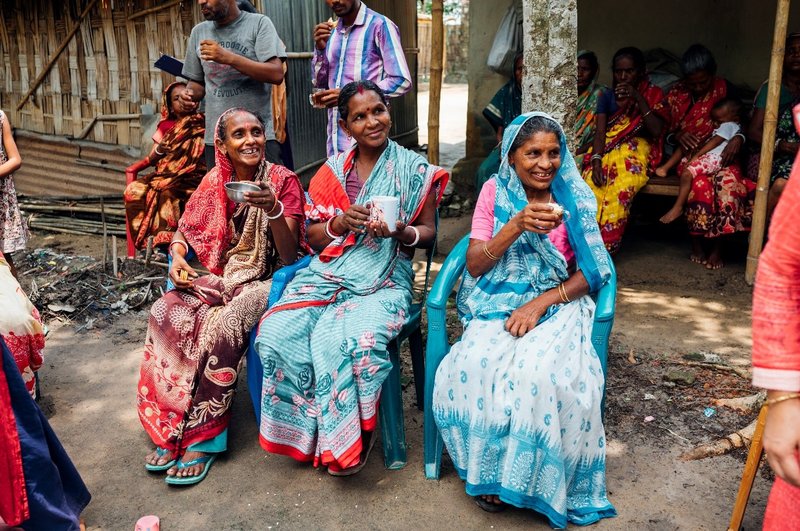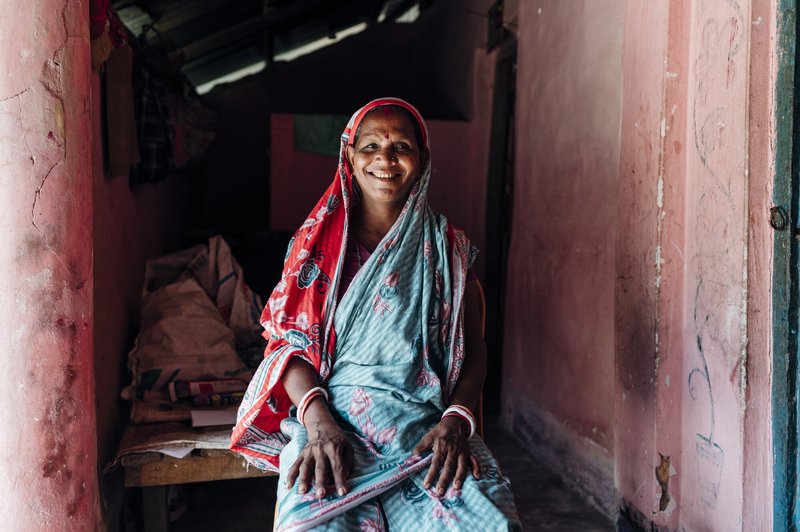Honouring women like Aloka on International Women's Day
International Women’s Day on 8 March is a day when both the achievements of women are celebrated as well as a day to drive forward change for women worldwide.
This week, as we prepare to mark the day, we're honouring a group of stoic, older women from Bangladesh. By worldly standards these women are fairly unremarkable. They haven't changed the world and won’t go down in history.
Yet their stories show they are some of the most remarkable women of all. They are proud grandmothers, mothers and fiercely hard workers. They are the glue holding their families together. As well as being the breadwinners, they are first up to make breakfast and look after the young. A long day picking tea leaves ends with collecting firewood on the way home so they can cook the family dinner. These women are the unsung heroes of their communities.
Women are the backbone of the tea industry in Sylhet, the region of Bangladesh with the highest tea production. Its gentle rolling hills and subtropical climate are perfect for growing tea. As a result, 600,000 people live and work on the tea estates of Bangladesh. Three quarters of the workforce are women.
If you ask the question why tea pickers tend to be women, the answer given is that smaller hands are an advantage. Many learnt the art of niftily swiping the leaves from their stems from their mothers. Speed and efficiency are everything when you are paid by the kilogram.
Cynically, the answer could also be that women tend to be lower paid than men. But whatever the true answer, the female workforce in the tea gardens is made up of ethnic and religious minorities. To some extent they are all marginalised by mainstream society in Bangladesh. Yet they form a tight-knit community with friendships between the tea pickers often going back decades. They live in basic homes provided by the tea estates and all is well for as long as they remain health enough to work.
Aloka's story
At first light grandmother Aloka can be seen with her friends and neighbours filing into the tea gardens. Their triangular hats bob along the neat rows of tea bushes. All day they toss lush green leaves into large wicker baskets strewn across their backs. They toil until the light fades and it is time to go home.
Aloka (pictured below) began working as a tea picker in Sylhet when she was a teenager. She was happy and content with her life in the tea gardens until leprosy set in. She was diagnosed and treated for the disease when a Leprosy Mission worker noticed a discoloured patch on her left hand. Although she was able to get prompt treatment to cure her leprosy, the cure came too late.

Nerve damage caused by leprosy means Aloka's fingers will no longer straighten. As a result, she can now only pick tea leaves with her right hand. As she is paid by the kilogram, she earns a fraction of what she once did, impacting her entire family.
Although her circumstances are far from ideal, Aloka is aware life could be so much worse. If her leprosy had been left untreated for much longer, she would have lost all feeling in both hands. The decline would have been gradual until the day her hands became useless. On that dreadful day she would not only have lost her job, but the family home. As Aloka and her husband Sunil live with their son and one of their daughters and her children, the impact would be far-reaching.
Unusually, there is an acceptance of leprosy inside the tea estates. This is likely to be because the whole community is stigmatised to some extent. There is safety in numbers and the women stick together. Elsewhere in Bangladesh, however, there can be such prejudice surrounding leprosy. The tea workers are thankfully protected from this until the day comes when they can no longer work.

An urgent need to find new cases
Head of Fundraising at The Leprosy Mission, Louise Timmins, said there is a real urgency to upscale the leprosy detection work.
She said: "Our team of health workers in the tea gardens of Sylhet have been staggered by the number of new leprosy cases they are finding. Since going into the tea estates in 2017, more than 1,600 new cases of leprosy have been found and cured.
"These new cases are not just the tea workers, but their families who live on the estates. Even young children are showing the early signs.
"The rate is 20 to 30 times the global average and the more our health workers look, the more leprosy cases they find.
"There is a real urgency to find and cure new cases of leprosy before disability sets in. These teams of amazing women tea workers are at risk of losing everything they know and love. This is simply because of a disease that is easily treatable with a combination of antibiotics."
"My colleagues in Bangladesh are already running pop-up clinics in a third of the tea gardens in Sylhet, finding and curing new leprosy cases.
“Knowing the full extent of the problem, we desperately need the resources to scale up this work."
It costs just £24 to find a cure a person like Aloka of leprosy, while a gift of £111 could help run a a pop-up clinic in a tea garden to find and cure leprosy.
All photos: Ruth Towell/The Leprosy Mission